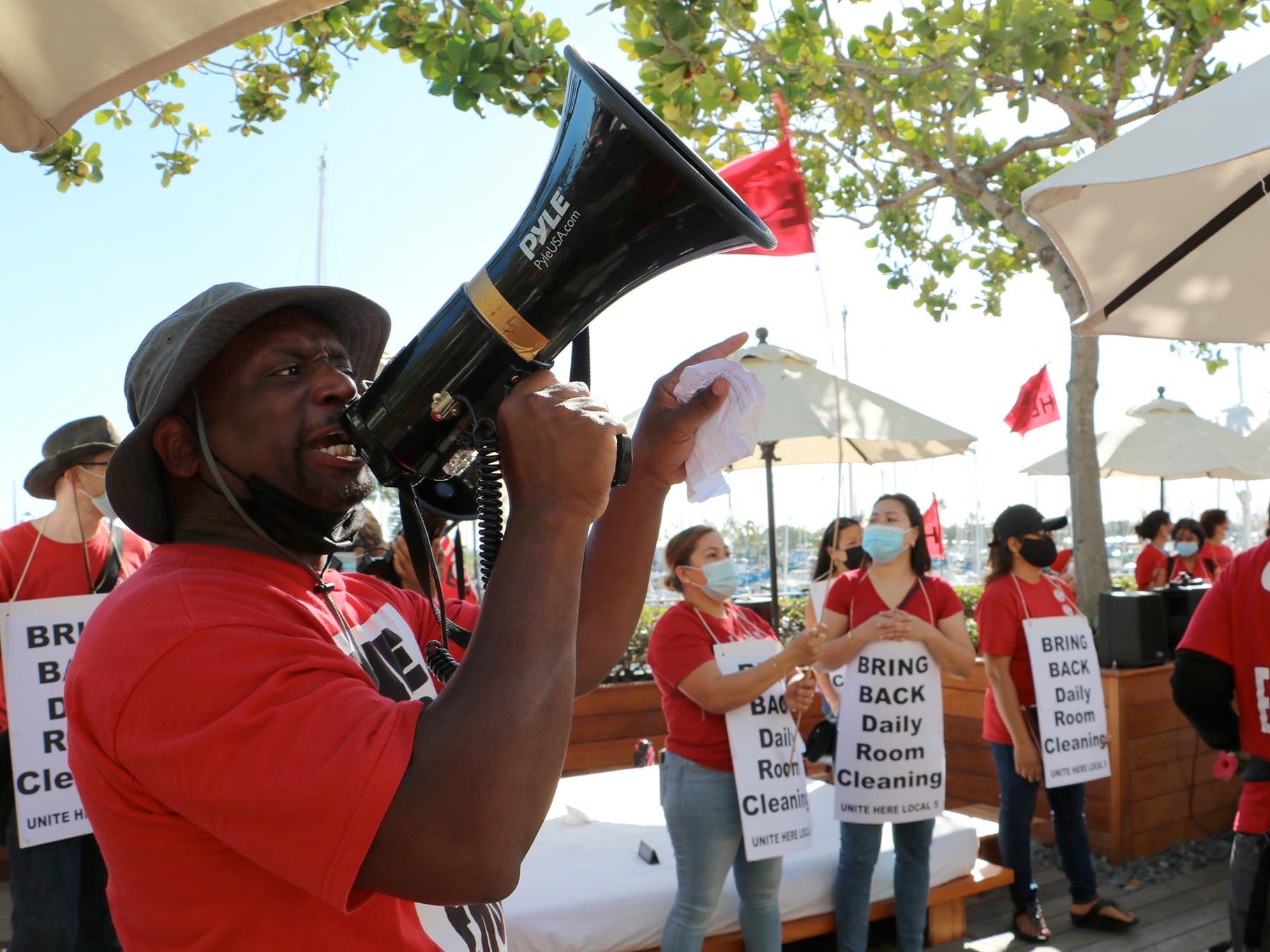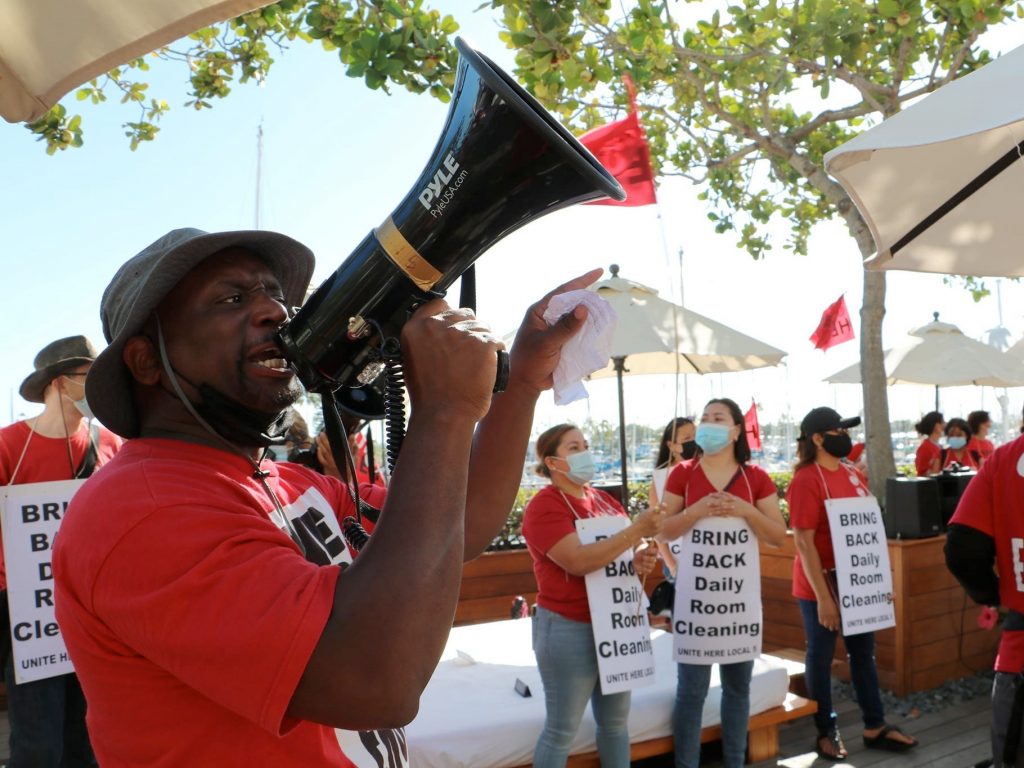
Bryant De Venecia/Unite Here
- Many hotels and resorts are seeing reservations start to return to normal levels again.
- A lot of their staff, however, remain out of work after hotels and resorts cut back on services.
- The result is financial stress, more work for staff who have returned, and a poor guest experience.
- See more stories on Insider's business page.
Meybel Landaverde has grappled with a tough calculus in the 18 months she has been unemployed.
"I had to decide which bill was more important than others," she said. "I was talking to my car insurance company all the time to see if they'd give me more time to figure out how I can pay them."
Landaverde was furloughed last March from her job as a host at the Urban Tavern restaurant at the Hilton San Francisco Union Square, where she has worked for roughly 17 years. She is one of hundreds of thousands of hotel workers, many of whom are women or people of color, who remain out of work as hotels see business recover but continue to go without services like regular housekeeping, room service, and restaurant and bar service.
US hotel occupancy this year is expected to average 55.9%, up from 44% last year, according to a report from the American Hotel & Lodging Association. Average US hotel occupancy was 66% in 2019, before the pandemic hit.
More than one in 5 hotel jobs that were lost in the pandemic, roughly 500,000 of them, won't return by the end of 2021, the report found. It also says the industry probably won't rebound to 2019 levels until at least 2023.
"Staffing levels at our properties are best assessed hotel by hotel and are informed by market demand, local business environments, and recommendations from government and health authorities," a Hilton spokesperson said in statement to Insider. "Labor continues to be the biggest issue facing our industry right now, and many hotels are quite actively hiring."
Landaverde says it's frustrating to see hotels hold out on calling back furloughed staff because "the hotels don't need the money that I need."
Unite Here, a union representing 300,000 hospitality workers in the US and Canada, says 98% of its members were out of work at one point in the pandemic.
Being furloughed last September was "a very hard moment" for Tony Correa, who has worked in room service for more than 20 years at the Hilton Boston Logan Airport. He has been staying afloat with pandemic unemployment benefits, but those will expire in September.
"I've never stopped working for this long a time," he said. "I was thinking about the whole situation, how it's going to be to support the family."
Service cuts hurt guests, too.
"If you get rid of daily cleaning, you don't have food and beverage options, and there's very little at the front desk, that's more like a college dorm, not a hotel," Unite Here President D. Taylor said. "This is all about cutting costs and seeing if the guest will take it."
Guests, in turn, frequently complain to hotel workers.
Jason Maxwell, a bartender at the Waikiki Beach Marriott Resort & Spa and The Modern Honolulu, was furloughed last April but often hears "irate" guests' complaints from working colleagues.
"It's just a huge mess," he said. "The guests are very upset, and they take it out on the workers. That creates stress for the workers, and the workers are already doing double the work they were doing before."
Workers fear guests won't return if services remain limited, which could further threaten their livelihoods.
"The guests always tell us they feel mistreated; they feel like they're not getting what they paid for," said Ligia Leal, a housekeeper at the Hilton Stamford. "Already, we're not getting five days [of work], but if the guests aren't satisfied, they might not come back and then we might get even less work."
Some companies say that's the goal. In a February earnings call, Hilton President and CEO Chris Nassetta said the company was focused on "creating more labor efficiencies, particularly in the areas of housekeeping, food and beverage and other areas" so Hilton brands will ultimately "require less labor than they did pre-COVID." In April, Marriott began testing out "contactless arrival kiosks."
"Throughout the pandemic, we discovered guests enjoyed the flexibility of on-demand housekeeping services and have varying levels of comfort with someone entering their rooms after they have checked in," a Hilton spokesperson said. "We encourage our guests to call the front desk to request daily room cleaning."
Many hotel staff can't afford to be out of work much longer. Maxwell has taken a job scheduling COVID-19 vaccinations for people but says his savings, including money set aside for his dream of buying a home, are "pretty much depleted."
"It's almost like they're making us fight over the scraps," he said. "They're trying to make their money back by hurting us."
Marriott and The Modern Honolulu did not respond to requests for comment.
